INTOLERANCE OP-ED
Democracy in danger: Hate has taken hold in India
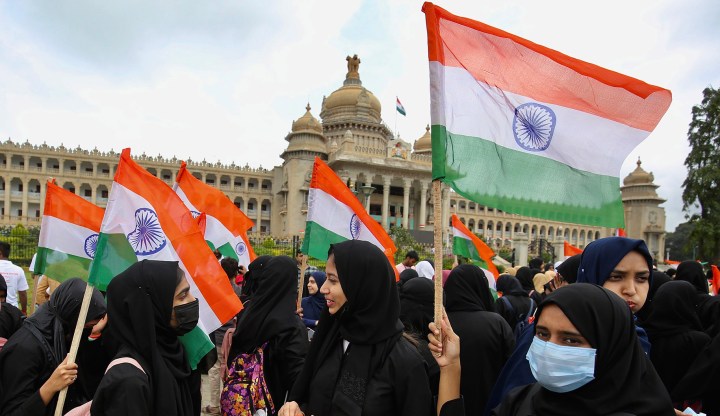
On Friday, 19 August the weekly Jumu’ah (Friday prayers) at the Claremont mosque in Cape Town held a silent vigil to mark the partition and independence of Pakistan and India on 14 and 15 August 1947 and the 10th anniversary of the Marikana massacre. The aim was to protest human rights violations locally and globally. This is the post-Jumu’ah speech given by the globally respected human rights activist Sunita Viswanath.
I am deeply honoured to be with you all today at the Claremont mosque, which played a historically important role during the movement to end apartheid, and today continues that legacy by openly rejecting homophobia and all forms of bigotry and being an inclusive house of worship.
While my own religion, Hinduism, is the source of India’s own 3,000-plus-year-old systemic and dehumanising system of caste and caste hierarchy; as a progressive Hindu, I stand resolutely against caste and all forms of bigotry and apartheid. I am co-founder of a US-based advocacy organisation, Hindus for Human Rights, and we are concerned about the human rights of all, particularly in India.
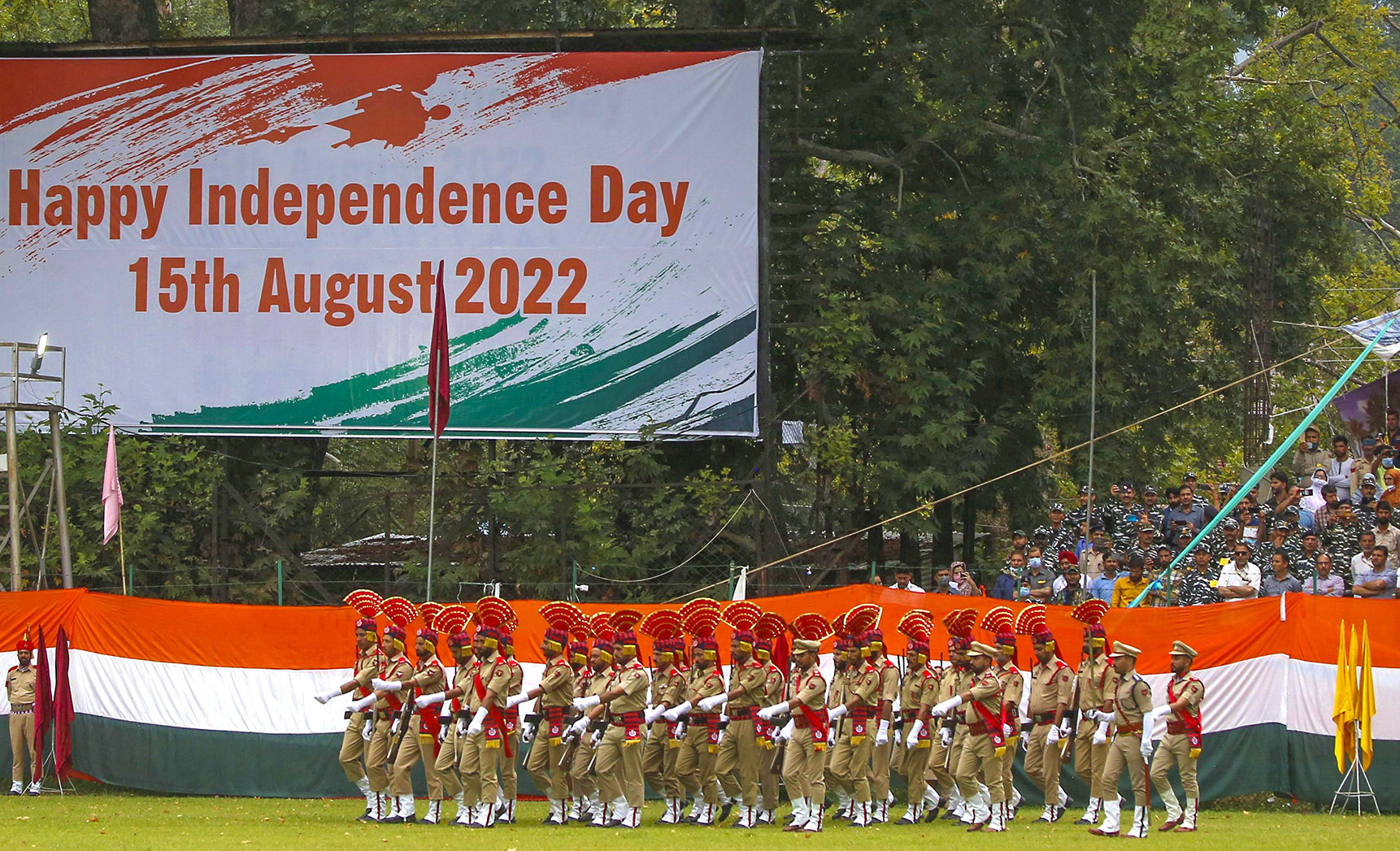
Indian security personnel march during the celebrations for the 75th anniversary of Indian Independence, in Srinagar, Kashmir, India, on 15 August 2022. (Photo: EPA-EFE / Farooq Khan)
I am speaking to you on the occasion of India’s 75th Independence Day. Republic Day and Independence Day are usually days of great celebration in India and the diaspora, but for anyone who cares about democracy and the rights of all, this is a time of great concern rather than celebration.
Gandhi is perhaps the spiritual, political and ideological meeting place of South Africa and India. Nelson Mandela and Albert Luthuli were both inspired by Gandhi, and Gandhi’s method of satyagraha or nonviolent civil disobedience was their chosen method of political struggle.
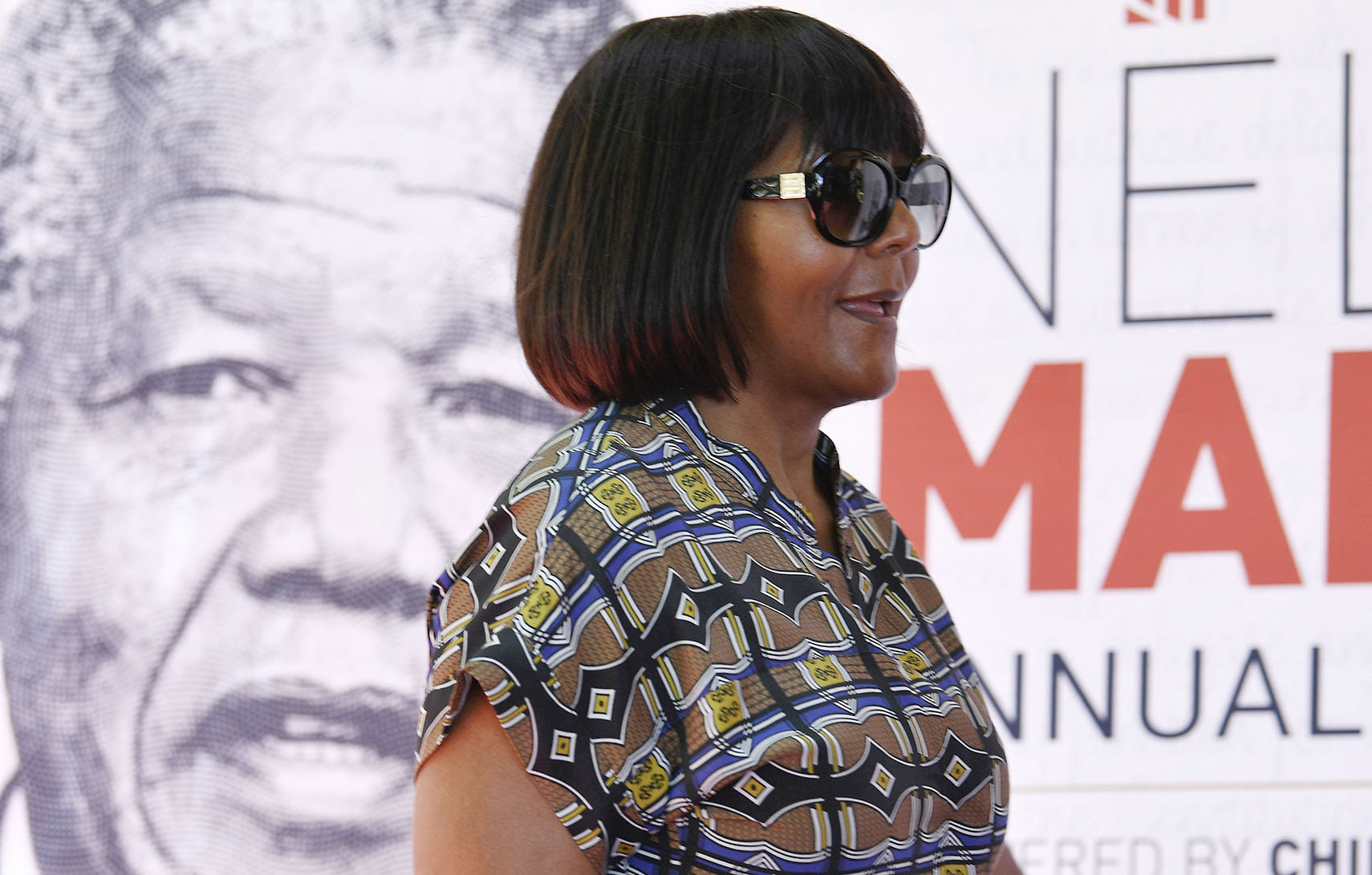
Nelson Mandela’s granddaughter Ndileka Mandela. (Photo: Gallo Images / Frennie Shivambu)
Nelson Mandela’s granddaughter Ndileka Mandela recently joined all of us who are raising the alarm. She wrote: “Indian Islamophobia has corroded what was once the world’s largest democracy.
“In South Africa, the Indian model mattered immensely — I know because my grandfather Nelson Mandela time and again referenced India’s freedom struggle and India’s freedom fighters as examples for how we could end — but also replace — apartheid.
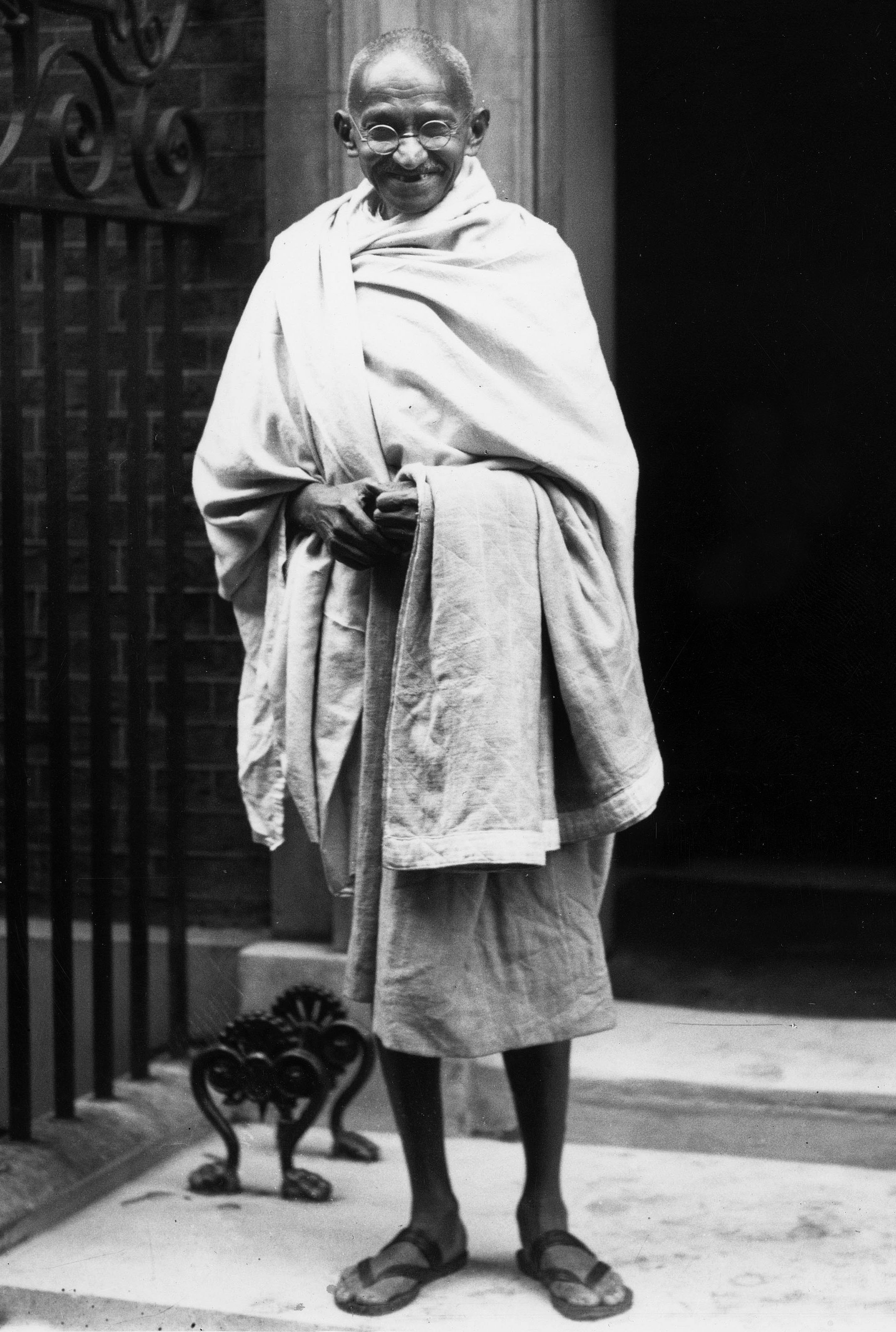
3rd November 1931: Indian leader Mahatma Gandhi (Mohandas Karamchand Gandhi), outside 10 Downing Street, London. He was in London to attend the Round Table Conference on Indian constitutional reform. (Photo: Central Press / Getty Images)
“Although India’s leadership could have sought a more sectarian, authoritarian or intolerant model of government, the young India instead pushed a democratic and pluralistic vision, which immensely influenced the rainbow nation we have tried to build in South Africa. But the India of today is decidedly not the India of 75 years ago.”
As India, the country of my birth, turned 75, several disturbing incidents took place both in India and in the US, the country where I live. These incidents bring home to me the undeniable fact that the hate that has taken hold in India is also very prevalent in the diaspora.
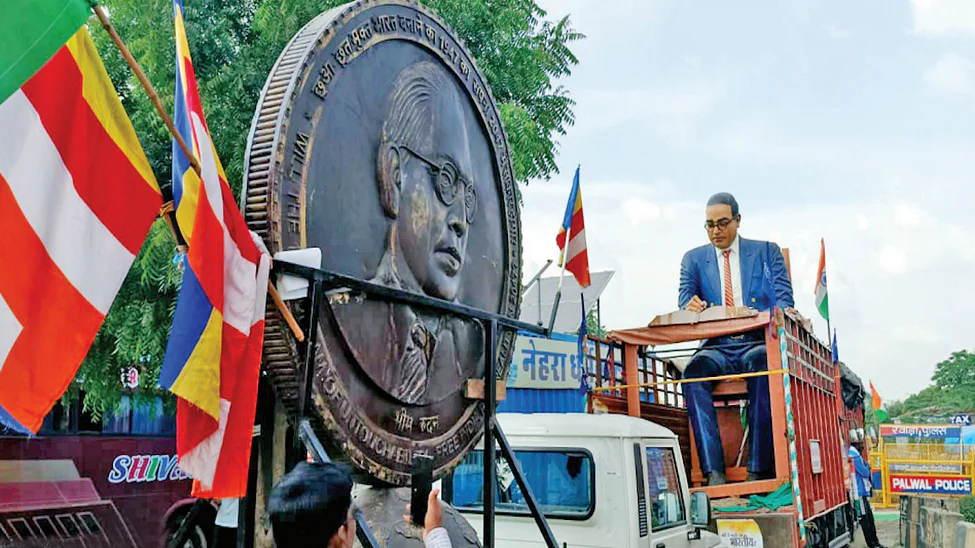
Leading Dalit rights leader and Hindus for Human Rights advisory board member Martin Macwan travelled with a huge group from Ahmedabad to Delhi with a massive brass coin made from the melted copper pots of poor villagers all across India. This peaceful group was met by police at the Haryana border wielding water cannons, and prevented from entering Delhi. (Photo: Navsarjan / Unsplash)
- Leading Dalit rights leader and Hindus for Human Rights advisory board member Martin Macwan travelled with a huge group from Ahmedabad to Delhi with a massive brass coin made from the melted copper pots of poor villagers all across India. There is a tradition in some Dalit communities that you put a coin in the foundation of a new house. So Martin ji and his comrades were travelling with this huge coin, engraved with the words, “Will the 1947 dream of an untouchability-free India become a reality in 2047?,” offering it to be placed in the foundation of the new Parliament building. This peaceful group was met by police at the Haryana border wielding water cannons, and prevented from entering Delhi.
- Just outside a Hindu temple in Queens, New York City, someone broke a Gandhi statue as well as a tulsi plant, considered sacred by Hindus. A local Hindu politician held a press conference along with the temple and two Hindu American organisations, both Hindutva (Hindu nationalism) aligned. The speeches given were all very pro-Gandhi and characterised the vandalisation as a Hinduphobic hate crime.
- A nine-year-old Dalit boy in Rajasthan was beaten to death by his teacher for drinking from a water pot that was only meant for upper-caste children.
- A group of 30 sadhus released a so-called draft constitution for the Hindu Rashtra (nation) being built by Hindutva forces currently ruling India. In this dystopian draft constitution, the capital of the proposed Hindu Rashtra is Kashi and in it, Muslims and Christians will not have the right to vote. The existing legal system will be replaced by one fashioned on the lives of gods in the Treta and Dwapara yugas.
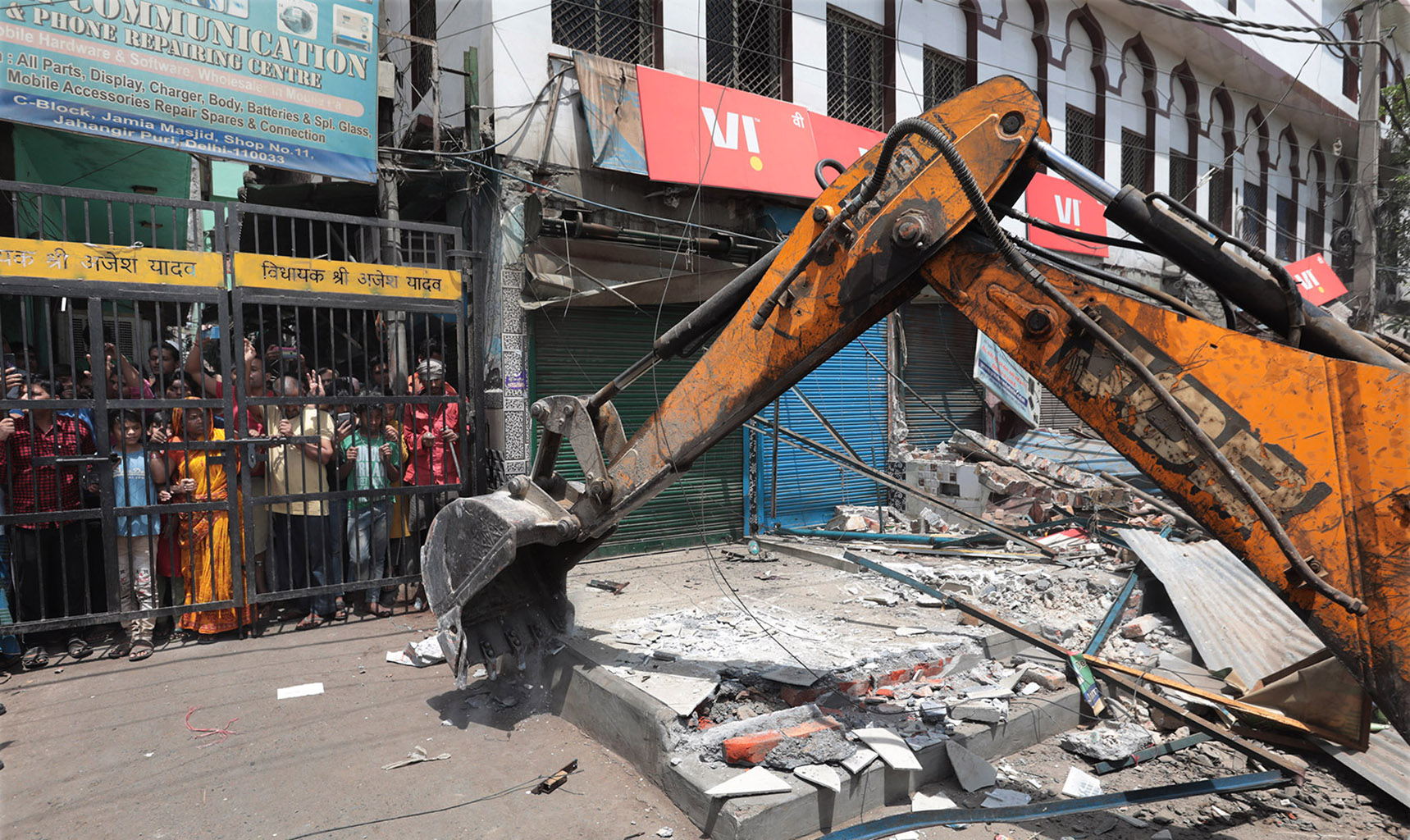
A bulldozer demolishes structures in violence-hit Jahangirpuri area in New Delhi on 20 April 2022. (Photo: EPA-EFE / Rajat Gupta)
These are ages or eons in the Hindu conceptualisation of time, which are two million and 800,000 years ago respectively. The education system will be an exclusively Hindu one. The existing parliamentary system will be abolished and the new one will defer to the varna system, that is, the birth-based caste system. The map in the new “constitution” is of Akhand Bharat — which means that the Hindutva vision is of the whole Indian subcontinent, including Pakistan and Bangladesh — as unpartitioned and Hindu. These sadhus are not fringe elements — and the dharam sansads (religious ceremonies) where they gather are de facto campaign events for the Bharatiya Janata Party (BJP). This is hardly a secret. As one sadhu in the group stated: “We are sadhus of the BJP. BJP is like the crown of us sadhus.”
- On 15 August, Hindutva groups in New Jersey held an Independence Day procession in Edison, a large metropolis, in which they paraded bulldozers with Uttar Pradesh Chief Minister Yogi Adityanath’s photo. While we have all been aghast at the new government tactic of bulldozing the homes of those expressing their dissent through protest, particularly Muslims, falsely alleging that the houses are illegal structures, this is a preposterously brazen statement — in New Jersey — saying, “We will bulldoze Muslim homes and there’s nothing you can do about it.”
The flag and the bulldozer: As India turns 75, it slides deeper into fascism
- And among all the news about India’s 75th, I noticed a headline in The Washington Post on 12 August: As India marks its first 75 years, Gandhi is downplayed, even derided. A more muscular, chauvinistic India is casting aside the ‘father of the nation’ for other heroes.
The highest form of patriotism is dissent
Many will be angry that there are people like me expressing concern rather than exhibiting patriotism on Independence Day. We are called anti-national and worse. I would argue that the highest form of patriotism is dissent. It is an act of love for India to decry these and other instances of human rights atrocities and brazen expressions of Hindutva hate.
Furthermore, while we celebrate 14 and 15 August as the Independence Days of Pakistan and India, respectively, we are also commemorating the bloodbath that resulted from the partition, in which more than a million people were killed and perhaps 20 million displaced along religious lines. It is impossible to know how many millions of women were raped during the carnage. We must never let this horrifying truth of our history be lost in patriotic fanfare and flag waving.
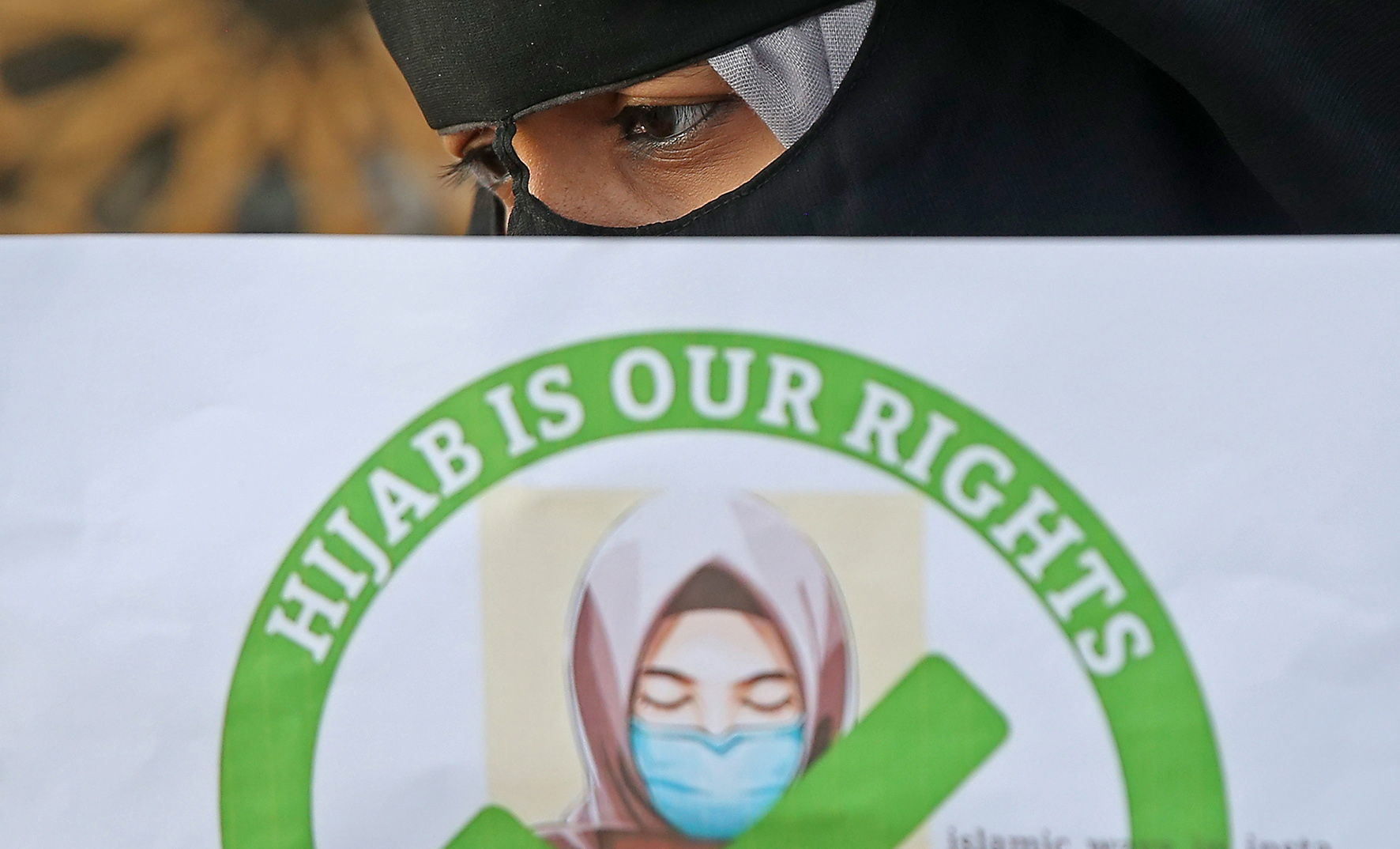
An Indian Muslim attends a protest in Bangalore, India, on 7 February 2022. (Photo: EPA-EFE / Jagadeesh NV)
It seems a miracle that while partition took place along Hindu-Muslim lines, both Pakistan and India were created as secular nations where all have equal rights regardless of religion, and there is no one religious state. Of course, after some years Pakistan became an Islamic nation, but India has now existed for 75 years under a Constitution that states we are a secular democracy. A nation which may have a Hindu majority but which promises to secure to all its citizens:
- Justice: social, economic and political;
- Liberty of thought, expression, belief, faith and worship;
- Equality of status and of opportunity; and to promote among them all:
- Fraternity, assuring the dignity of the individual and the unity and integrity of the nation.
These are words authored by India’s greatest Dalit leader, the architect of the Indian Constitution.
This is what is in peril today.
Since you are a mosque with a liberal and open-minded vision of your own faith, you will understand better than anyone the plight of a Hindu sister like me — someone who rejects the oppressive parts of Hinduism like caste, but who is motivated, propelled and guided in the world by the best parts of Hinduism. Someone who strives to build, live and be the best version of Hinduism one can imagine.
For someone like me, there is a double heartbreak:
- That my beloved country of origin is headed on a path of further religious oppression and violence, and its democracy is in danger; and
- That this oppression is taking place in the name of my religion, my faith.
The perpetrators are the Hindu majority, and the communities that are in existential danger are the Muslim, Christian and other minorities. While I connect my own legacy to all the Hindu and other anti-caste reformers throughout history, including Gandhi, and am mobilising Hindus to embody the best version of their faith, the Hinduism that is winning today, ruling today, is the worst form.
The ideology of India’s current rulers is Hindutva or Hindu extremism. To say “Hindu fascism” isn’t an exaggeration.
There have been many critiques of Gandhi over the decades — that he was racist, sexist, and upheld the caste system. Critiques of Gandhi and all historical figures and present-day public figures are valid and appropriate.
However, everyone who is concerned about declining democracy and growing violent Islamophobia in India today, as well as in the diaspora, must be aware of the disingenuous stance of the Indian government and the forces of Hindutva on the personage of Gandhi. They may be pro-Gandhi in their rhetoric, but their view on Gandhi is captured in the stark fact of history: it was a proponent of Hindutva that assassinated Gandhi.
And today, Gandhi’s assassin, Nathuram Godse, and VD Savarkar, the originator of the Hindutva ideology, are the heroes for Hindutvadis, not Gandhi. Our critique of Gandhi as a man should not deter us from taking on the forces of hate that are decimating the inclusive and secular, albeit imperfectly so, India that he co-birthed. The consequences are too dire.
Gandhi’s grandson Rajmohan Gandhi is also an advisory board member of Hindus for Human Rights. He regularly advises us, “There will be a day tomorrow when we can argue and debate the many important issues we are concerned with. But today we must put our differences aside, and unite in our fight against Hindutva.”
Radical inclusiveness
The oldest Hindu text, the Rig Veda, which introduces caste through a section called Purusha Shukta, also teaches us:
Vasudhaiva Kutumbakam (the world is one family).
Aano bhadra krtavo yantu vishwatah (let noble thoughts come from all directions).
These teachings invoke the same radical inclusiveness that I see you all embodying: an openness of heart and mind, to each other across our differences, and to those of other faiths and opinions. The ultimate teaching is that we are all one.
As Lord Krishna says in the Bhagavad Gita, the ideal devotee is “Para Dukha Dukhi,” one who sees the joys and sorrows of the other as one’s own.
In the Hinduism that I embrace, there is no “other”. The highest calling of my faith is to see myself, and to see God, in the face of every other person regardless of race, religion, case, gender, and regardless of whether we share the same opinion on divisive issues.
India was born out of Hindu-Muslim enmity, division, fissure. The founders of India — especially Gandhi — were devoted to Hindu-Muslim Ekta or Unity. Gandhi was killed by Nathuram Godse, one of the earliest proponents of Hindutva, people who wanted India for Hindus alone and believed that India must be militarily secured for Hindus.
The seeds sown more than 100 years ago by the founders of Hindutva ideology are bearing their strange and horrifying fruit today.
India is undeniably on the path to being transformed from a secular democracy to a Hindu Rashtra (nation), where Muslims are not welcome, cannot vote, and whose lives will be in constant danger. And the worst possible eventuality — one which has been deemed by several respected international organisations such as Genocide Watch and the US Holocaust Museum, as very possible, indeed, likely — is a genocide of Muslims in India.
Hindus for Human Rights has committed ourselves to Hindu-Muslim Ekta (indeed the unity of all the glorious diversity of Indian society, including people of all castes, faiths, etc) as the cornerstone of all that we do. We conduct all our advocacy in partnership with Muslim, Dalit, Christian, Sikh and secular organisations, and we take every opportunity to add a Hindu voice to the resistance to Hindutva.
We also take every opportunity to extend a Hindu hand of love and solidarity to the communities being targeted by hate and violence. It is love and solidarity that I am bringing to you all today.
We believe that what is being attacked is our diversity, our right to be together in relationships across all our differences. The strongest response, the strongest resistance, is our defiant unity. Hindus and Muslims of conscience must cling together and refuse to be divided.
I will end with a line from one of Gandhi’s favourite bhajans (devotional songs):
Ishwar allah tere naam
Sab ko sanmati de bhagwan
Ishwar and Allah are both your names
Oh Lord, bestow wisdom on us all DM/MC
Sunita Viswanath has worked for 25 years in women’s and human rights organisations. She is co-founder and executive director of the US-based faith-based advocacy organisation Hindus for Human Rights.




















 Become an Insider
Become an Insider
Ghandi was a racist. All over Africa his statues are being torn down. I cannot understand why he is always perceived to be such an outstanding example of human rights. He often referred to blacks using the “K” word and perceived blacks to be of a lower standing than Indians.
Thank you for articulating in detail, my response to an article on “compassionate confrontation” by Paul Hoffman on the 17th August ! What is very concerning is the role (or lack thereof) of the ‘judiciary’ in India, in acting as a bulwark against this spread of hate. In SA, we the citizens have come to expect the judiciary be a primary source of defence against the forces of anti-constitutionalism . The growth and expansion of narrow religious fervour is gaining ground globally. It is a favourite recipe or tool in the hands of the bigoted.